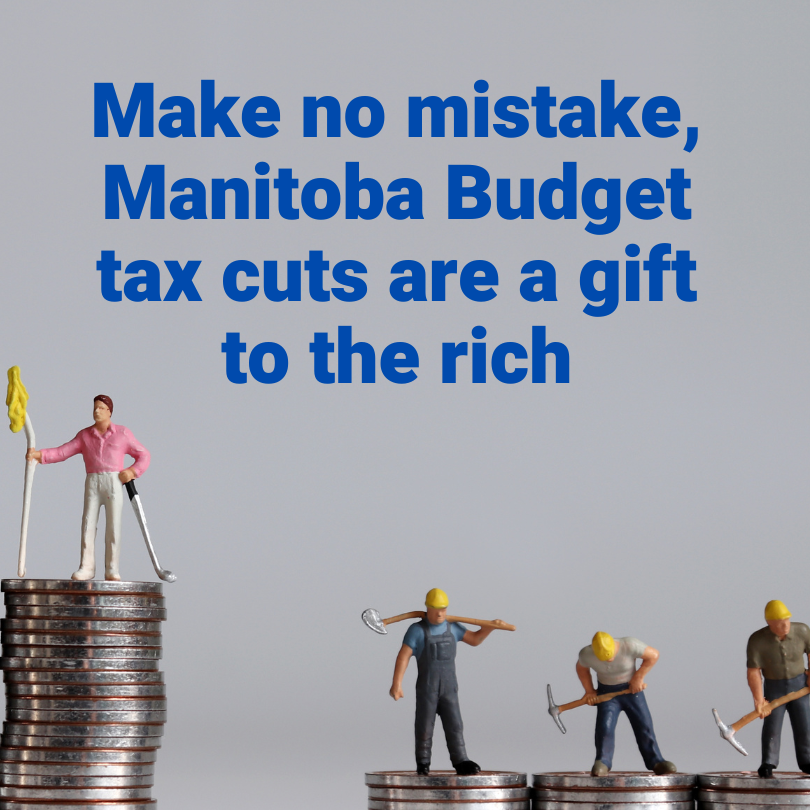By Niall Harney

Previously published in the Brandon Sun and The Winnipeg Free Press, March 23, 2023
The 2023 Manitoba Budget released on March 7 announced close almost $1 billion in revenue cuts. Despite claims about affordability for low and middle-income households, most Manitoba families will not receive anything near the tax savings promoted by the province. Make no mistake, these tax cuts are a giveaway to the rich that will reduce our capacity to fund public services for years.
The centrepiece of the 2023 tax plans is a change to the Basic Personal Amount, income that is exempt from provincial tax. The estimated cost of raising the Basic Personal Amount from $10,855 to $15,000 in 2023/24 is $326 million. The other part of the new tax measures released in budget 2023 is a substantial change to provincial income tax brackets, shifting the first bracket to end at $47,000 and the third to begin at $100,000 rather than $79,625. Tax bracket changes are estimated to cost an additional $160 million in 2023/24.
When CCPA economists ran the numbers on taxable incomes in Manitoba, considering all other tax credits and benefits, Manitoba’s top 10% of tax filers will receive a whopping 26% of all benefits, totalling $132 million. The top 20% receive 42% of savings. The bottom half of Manitobans (making under $43,000) receive only 24% of savings.
In reality, low-income households get little benefit from raising the Basic Personal Amount. The average savings for the bottom 20% of tax filers in Manitoba will be just $37 in total. It is only around the median income that the Basic Personal Amount savings espoused by the Manitoba government begin to take full effect, but it’s the richest Manitobans who receive the biggest break.
The average benefit for individuals making over $101,300 per year will be $1,322 in 2024. This is over double the average benefit for individuals earning between $43,000 and $79,200, approximately $574. For anyone earning less than the median income, the average benefit will be $237.
High-income earners in Manitoba have generally done very well through the pandemic. This is on top of 30 years during which median incomes have stagnated while incomes for the top 10% have soared.
The true cost of these tax cuts will increase over time in the form of compounding annual lost revenue. This loss of provincial revenue reduces our capacity to invest in public services like healthcare, education, or addressing poverty. At a moment in our province’s history, when we are sending patients out of province for elective surgeries and when school divisions are cutting teachers, we cannot be diverting hundreds of millions of dollars from the public system into the pockets of the wealthiest among us.
Manitoba has received a windfall increase in revenue this year, thanks to tax receipts buoyed by inflation, a large increase in earnings from Manitoba Hydro, and over $1 billion in additional federal transfers (intended to improve healthcare and ensure public services in Manitoba are of equal quality to other provinces). Using these temporary revenue increases to cover the cost of tax cuts benefitting mostly high-income earners is fiscally irresponsible. In the case of a recession, which remains a possibility in the next year, the province will face larger deficits.
Certainly, many Manitobans need support to get through the next year. Wages have not kept pace with inflation, putting a squeeze on many households who were already struggling to make ends meet. This support should be targeted towards those in our community who need it most and can easily be done through income-tested refundable credits, like the federal GST credit.
At the same time, we need to invest in our public institutions that provide the services we rely on at a low cost. $10 per day childcare is excellent, but more public spaces need to be created and staff trained to help families in need access childcare. School nutrition programs or further investments in social housing are other options to lower the cost of living while ensuring basic needs are met.
Niall Harney is a senior researcher at the Canadian Centre for Policy Alternatives – Manitoba, where he holds the Errol Black Chair in Labour Issues


